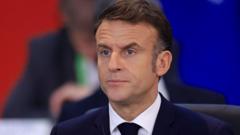In a significant move, French President Emmanuel Macron announced the formation of a panel tasked with investigating the historical relationship between France and Haiti. The commission will particularly focus on the implications of the steep debt demanded from Haiti following its independence.
France Initiates Commission to Examine Historical Ties with Haiti

France Initiates Commission to Examine Historical Ties with Haiti
A new commission aims to explore the historical impact of the debt imposed on Haiti post-independence, potentially shaping future relations between the two nations.
Article text:
In a groundbreaking initiative, French President Emmanuel Macron has unveiled plans to establish a commission to delve into the historical context of French-Haitian relations, specifically focusing on the ramifications of a massive debt burden shouldered by Haiti upon its independence. The debt, a staggering 150 million gold francs, imposed in 1825 to compensate French slave owners, has remained a controversial and poignant issue in Haiti's historical narrative.
The commission will consist of historians from both France and Haiti, who are expected to conduct a thorough examination and offer recommendations aimed at fostering a more sustainable and peaceful relationship between the two countries. Macron reflects on this painful legacy, stating that the debt fundamentally diminished the freedom of a young nation, anchoring it to the harsh tides of history from its very beginning.
For over a century, this independence debt has troubled Haitian society, fostering resentment and calls for reparations. While French officials have acknowledged the injustices of slavery, concrete discussions regarding the repayment of the independence debt have largely been neglected. Macron's acknowledgment of this historical grievance may represent a pivotal shift in diplomatic approach, as he believes that a sincere investigation can pave the way toward healing.
Haitian writer Monique Clesca has articulated the importance of this recognition, suggesting that such an acknowledgment may enable France to regain some respect and influence, particularly as former colonies reassess their relationships with the nation. Given Haiti's ongoing struggles with economic instability and gang violence—where more than 5,500 lives were lost to violence last year alone—the urgency of rebuilding trust and history feels more critical than ever.
The Haitian transitional presidential council, charged with restoring democratic processes and organizing elections, faces significant challenges amid escalating violence and a humanitarian crisis that has seen over a million people displaced. Macron's commission, while focused on historical analysis, holds the potential to influence diplomatic relations and address the long-standing grievances that have shaped Haiti's struggles.
In a groundbreaking initiative, French President Emmanuel Macron has unveiled plans to establish a commission to delve into the historical context of French-Haitian relations, specifically focusing on the ramifications of a massive debt burden shouldered by Haiti upon its independence. The debt, a staggering 150 million gold francs, imposed in 1825 to compensate French slave owners, has remained a controversial and poignant issue in Haiti's historical narrative.
The commission will consist of historians from both France and Haiti, who are expected to conduct a thorough examination and offer recommendations aimed at fostering a more sustainable and peaceful relationship between the two countries. Macron reflects on this painful legacy, stating that the debt fundamentally diminished the freedom of a young nation, anchoring it to the harsh tides of history from its very beginning.
For over a century, this independence debt has troubled Haitian society, fostering resentment and calls for reparations. While French officials have acknowledged the injustices of slavery, concrete discussions regarding the repayment of the independence debt have largely been neglected. Macron's acknowledgment of this historical grievance may represent a pivotal shift in diplomatic approach, as he believes that a sincere investigation can pave the way toward healing.
Haitian writer Monique Clesca has articulated the importance of this recognition, suggesting that such an acknowledgment may enable France to regain some respect and influence, particularly as former colonies reassess their relationships with the nation. Given Haiti's ongoing struggles with economic instability and gang violence—where more than 5,500 lives were lost to violence last year alone—the urgency of rebuilding trust and history feels more critical than ever.
The Haitian transitional presidential council, charged with restoring democratic processes and organizing elections, faces significant challenges amid escalating violence and a humanitarian crisis that has seen over a million people displaced. Macron's commission, while focused on historical analysis, holds the potential to influence diplomatic relations and address the long-standing grievances that have shaped Haiti's struggles.




















